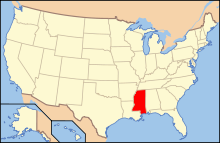LGBTQ rights in Mississippi | |
|---|---|
 | |
| Status | Legal since 2003 |
| Gender identity | Altering sex on identity documents does not require sex reassignment surgery |
| Discrimination protections | Employment protections for sexual orientation and gender identity (Bostock v. Clayton County) |
| Family rights | |
| Recognition of relationships | Same-sex marriage since 2015 |
| Adoption | Joint and stepchild adoption legal |
Lesbian, gay, bisexual, transgender, and queer (LGBTQ) people in the U.S. state of Mississippi face legal challenges and discrimination not experienced by non-LGBTQ residents. LGBT rights in Mississippi are limited in comparison to other states. Same-sex sexual activity is legal in Mississippi as a result of the U.S. Supreme Court decision in Lawrence v. Texas. Same-sex marriage has been recognized since June 2015 in accordance with the Supreme Court's decision in Obergefell v. Hodges. State statutes do not address discrimination on the basis of sexual orientation and gender identity; however, the U.S. Supreme Court's ruling in Bostock v. Clayton County established that employment discrimination against LGBTQ people is illegal under federal law. The state capital Jackson and a number of other cities provide protections in housing and public accommodations as well.
A Deep Southern Bible Belt state, Mississippi is known for being among the most socially conservative states in the country. A 2017 opinion poll showed that Mississippi, alongside Alabama, was one of only two states in the country where opposition to same-sex marriage outnumbered support. Additionally, the state has passed various religious freedom laws designed to protect religious beliefs, though these laws have been criticized for "giving religious people a license to discriminate" against LGBTQ people and have provoked both domestic and international backlash. Mississippi was the last state to allow same-sex couples to adopt after a federal judge ruled in May 2016 that the adoption ban unconstitutional. Recent opinion polls have reported a trend in support for some LGBT rights, with a majority of Mississippi residents now favoring an anti-discrimination law covering sexual orientation and gender identity.[1]
- ^ "PRRI – American Values Atlas". ava.prri.org. Archived from the original on November 16, 2018. Retrieved June 29, 2018.